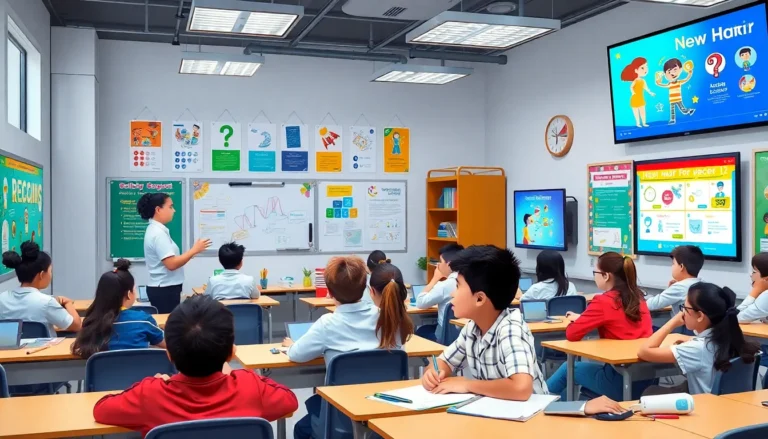Table of Contents
ToggleIn a world where toddlers can navigate tablets better than most adults, early childhood education has never been more crucial. It’s not just about learning the ABCs and 123s; it’s about laying the groundwork for future success. With the right resources, parents and educators can transform curious little minds into lifelong learners.
Enter the “Early Childhood Education Today” PDF—a treasure trove of insights, strategies, and a sprinkle of humor to keep things light. This isn’t just another boring document; it’s a guide that makes understanding child development feel like a walk in the park (with a side of giggles). Discover how to engage young learners and set them on a path to greatness while enjoying the journey. After all, who said education can’t be fun?
Overview of Early Childhood Education Today
Early childhood education plays a crucial role in developing skills essential for lifelong learning. Research shows that children who engage in high-quality early learning programs exhibit better cognitive, social, and emotional outcomes. These benefits extend beyond academic success and contribute to positive life trajectories.
Current trends indicate a focus on play-based learning, which cultivates curiosity and fosters creativity in young learners. Programs incorporating technology enhance educational experiences, preparing children for a rapidly evolving digital landscape. Innovative teaching strategies also emphasize personalized learning, catering to the unique needs of each child.
Parents increasingly value the importance of early education, seeking programs that support their children’s growth. Many educational institutions now integrate family involvement, allowing parents to participate actively in the learning process. This collaboration strengthens the connection between home and school, enhancing a child’s overall development.
Research from the National Association for the Education of Young Children emphasizes the benefits of early intervention programs targeting at-risk populations. These initiatives promote equity in education, ensuring that every child has access to quality learning experiences. The demand for well-trained educators is higher than ever, as they play a significant role in implementing effective early education strategies.
Communities are also recognizing the impact of quality early childhood education on future societal outcomes. Investments in early education yield substantial economic returns, reducing long-term costs related to remedial education and social services. Policymakers increasingly prioritize funding for early learning initiatives, reflecting growing recognition of their importance in shaping a child’s future.
Key Concepts in Early Childhood Education
Early childhood education serves as a cornerstone for lifelong learning, equipping children with essential skills. Understanding key concepts in this field fosters effective teaching practices and enhances learning experiences.
Importance of Early Learning
Early learning sets the foundation for cognitive, social, and emotional development. Children engaging in high-quality programs show remarkable improvements in their academic readiness, exhibiting better literacy and numeracy skills. Research indicates that these early experiences lead to lasting benefits, such as higher graduation rates and improved career opportunities. Parents and educators recognize the significance of promoting curiosity and creativity, facilitating an enriching learning environment. Investing in early education becomes crucial, as it paves the way for future success in a rapidly changing world.
Developmental Milestones
Developmental milestones serve as benchmarks highlighting critical growth stages in children. At ages 0-3, infants focus on motor skills and basic communication, while preschoolers aged 3-5 expand their social interactions and problem-solving abilities. Recognizing these milestones helps caregivers monitor progress and identify any potential developmental delays. Engaging children in play-based activities fosters creativity, a key component in reaching these milestones. Observing and supporting each child’s unique pace encourages confidence and independence, preparing them for subsequent educational experiences.
Trends in Early Childhood Education
Trends in early childhood education reflect the changing needs of modern society. Increasing emphasis on technology integration enhances learning experiences for young children. Schools incorporate digital tools to aid engagement, facilitating interactive learning environments. Devices assist educators in delivering personalized instruction, capturing children’s interests while developing essential skills.
Inclusivity in education practices continues to gain traction. Programs prioritize accommodating diverse learners, ensuring all children receive equitable opportunities. Strategies incorporate individualized learning plans that support varied abilities and backgrounds. Families and educators collaborate to create supportive environments that reflect cultural differences, promoting a sense of belonging. Research shows that inclusive settings boost social skills and reduce stigma, thereby fostering positive peer interactions.
Challenges Facing Early Childhood Education
Challenges in early childhood education significantly impact program effectiveness and child outcomes. Issues like funding inadequacies and teacher training demand attention.
Funding and Resources
Funding gaps hinder access to quality early childhood education programs. Many programs struggle to secure necessary financial resources for staffing, materials, and facilities. According to the National Association for the Education of Young Children, investments in early education yield significant long-term benefits, yet many communities lack adequate funding. Public policies often prioritize K-12 education over early learning, leaving earlier educational opportunities under-resourced. Increasing financial support and resources directly enhances program quality and sustainability, benefiting children and families alike.
Teacher Training and Retention
Teacher training and retention pose major obstacles. High-quality early childhood education relies on well-trained educators equipped with effective teaching strategies. Many teachers face low pay and insufficient professional development opportunities, leading to high turnover rates within the sector. Research indicates that programs with stable, experienced staff correlate with better student outcomes. Addressing these challenges requires strategic efforts to improve compensation and support ongoing education for early childhood educators, ensuring they remain motivated and committed to their roles in children’s lives.
Benefits of Quality Early Childhood Education
Quality early childhood education provides numerous advantages for children’s development. Academic readiness increases significantly for those in high-quality programs. Cognitive skills enhance as children engage with age-appropriate learning materials. Social competencies grow through interactions with peers, fostering collaboration and communication abilities.
Emotional development benefits from supportive learning environments. Children learn to express feelings and manage conflicts, building resilience and empathy. Improved literacy and numeracy skills correlate with participation in effective early education initiatives. Skills established in early education lay a foundation for future academic success.
Research from credible sources supports these findings. According to the National Association for the Education of Young Children, early intervention reduces educational disparities for at-risk populations. Children from marginalized communities gain essential skills, promoting equity in education. Long-term societal advantages emerge, leading to better career opportunities as these individuals progress through life.
Investments in early childhood education yield notable returns. For every dollar spent on high-quality programs, society can see a return of up to $7 in economic benefits. Policymakers increasingly recognize these impacts and prioritize funding for early learning initiatives. Collaborative efforts among families, educators, and communities strengthen children’s educational experiences.
Moreover, technology integration in early learning environments enhances engagement. Digital tools facilitate interactive lessons that capture children’s interest. Diversified teaching practices accommodate various learning styles, ensuring inclusivity for all children. Through this holistic approach, quality early childhood education lays the groundwork for lifelong learning and success.
The landscape of early childhood education is evolving rapidly and demands attention from parents educators and policymakers alike. The insights shared in the “Early Childhood Education Today” PDF serve as a vital resource for navigating this dynamic field. By embracing play-based learning and integrating technology into educational practices, communities can foster environments that nurture curiosity and creativity.
Investing in high-quality early education not only enhances individual outcomes but also contributes to societal growth. As awareness of the long-term benefits increases, it’s clear that prioritizing early childhood education is essential for building a brighter future for all children. The commitment to improving access funding and educator support will ultimately pave the way for lasting change in the educational landscape.







